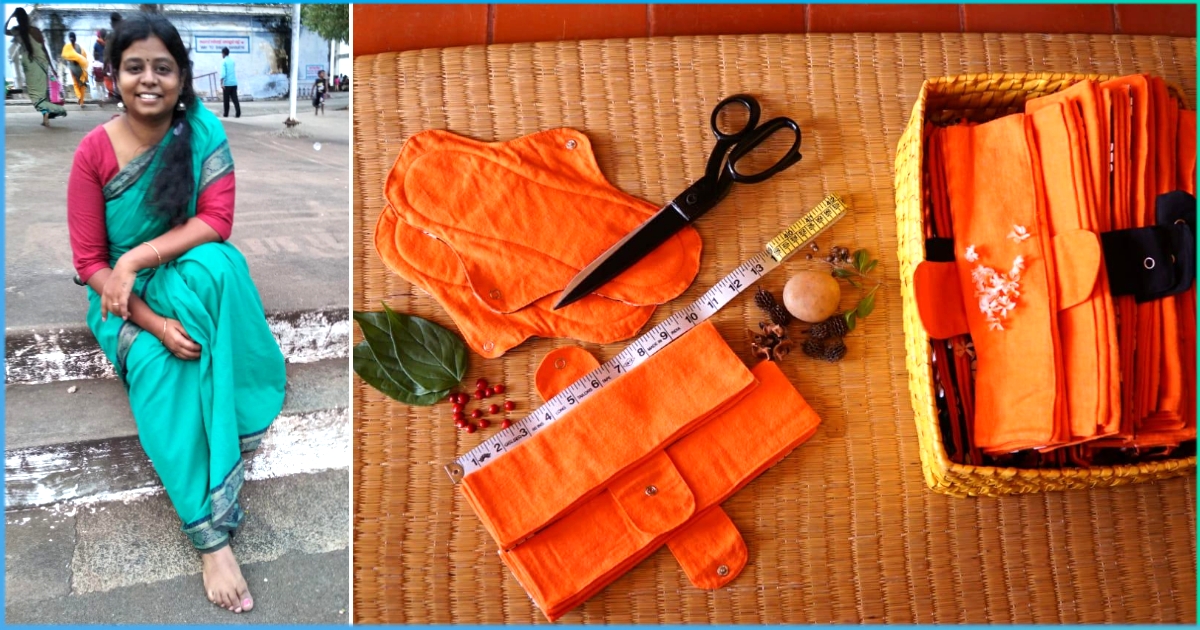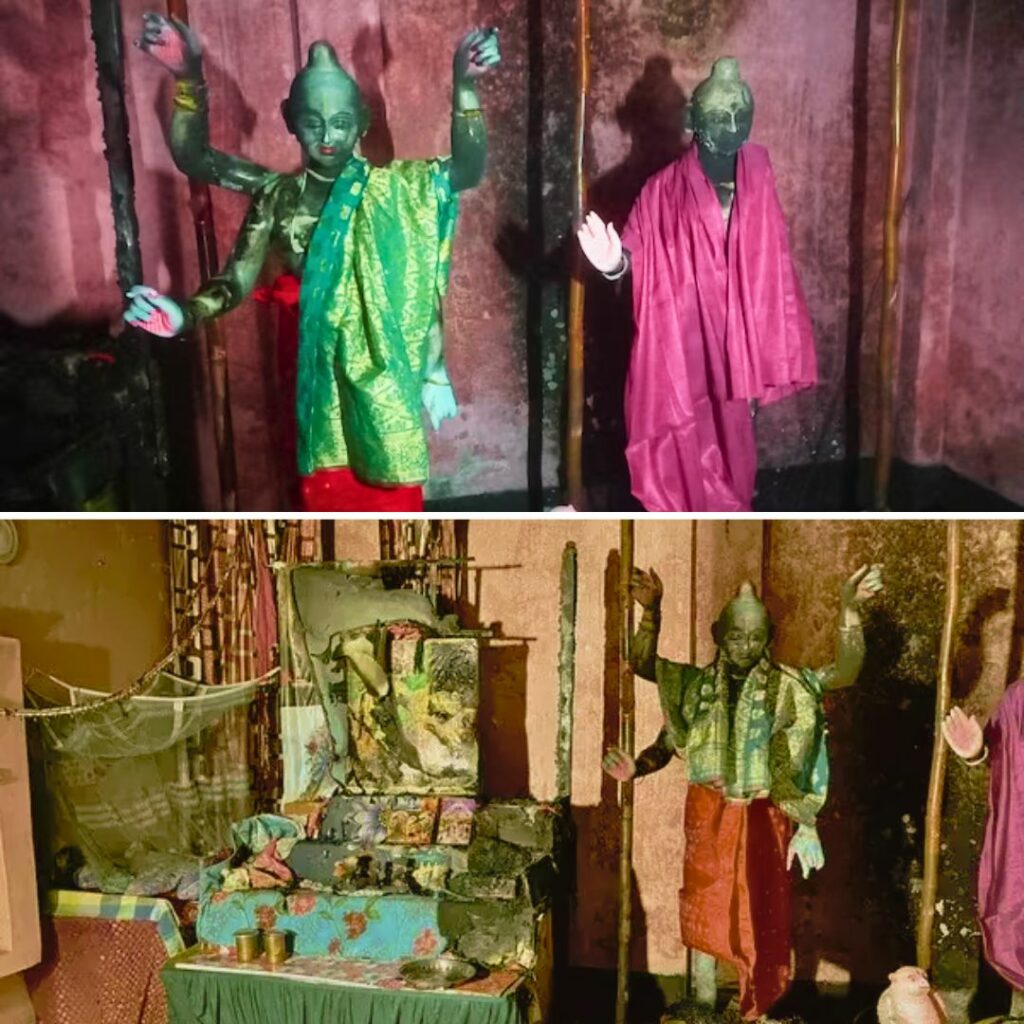“When I switched to cloth pads about four years ago, I felt the difference in comfort and usability. However, I was hesitant to discuss this with my family and friends, for fear of being mocked at, as I was reverting to a traditional method of using cloth during periods,” shares Abhirami Prakash.
“But once I opened up about my choice, I received an unprecedented support from everyone, as all of them were facing troubles with commercial pads. They were unaware of any viable alternative,” she adds.
To make more women understand the benefits of cloth pads, Abhirami Prakash started Pirai in July 2018, which manufactures high-quality, handmade and cost-effective cloth pads.

Speaking to Efforts For Good, she shares the adverse implications of regular sanitary napkins and explains why sustainable menstruation is the need of the hour.
Advocating menstrual education
The news of a 12-year-old girl in Tamil Nadu committing suicide after being period-shamed in school shook Abhirami Prakash. “On her suicide note, she left the question about what her fault was to deserve such a treatment. Shocked as I was, I resolved to generate menstrual awareness among all women to uproot the age-old taboos and irrelevant stigma around it,” says Prakash.

Working as a naturopathy physician in a multi-speciality hospital, Prakash frequently conducted cervical and breast cancer awareness campaigns for rural women and young girls. She discovered that the women in remote villages had little idea about normal menstruation. “I understood that before talking about diseases, women must be educated about the normal bodily processes, physical and emotional changes that a woman undergoes throughout her cycle,” she explains.

Switching to cloth pads
In Kerala, the garbage collectors will inquire if your trash contains disposed sanitary napkins. If yes, they will inevitably refuse to carry it. Every month, those few days might pose an added hassle for you to find newer ways of disposing used pads. Be it looking for dump yards everywhere or burning the pads, only to create a foul-smelling vortex of smoke that clouds your dignity as a woman. “Even if we bury them in some corner of our own yard, it takes around 500 to 800 years for these commercial pads to decompose. Rainwater seeps through them and pollutes the groundwater. Very few of us are aware of this,” she says.
While organising widespread campaigns in schools and rural belts, Prakash unearthed many lesser-known facts about the regular pads we all are accustomed to using. “Aside from my unpleasant personal experience with commercial napkins, I learnt that a woman produces around 130 kg of menstrual waste in her lifetime, most of which is as non-biodegradable as plastic. With more and more chemicals being added to commercial sanitary napkins, it is causing more harm to the reproductive organs than help,” explains Prakash.

The darker side of the immaculate white pads
The bright white pad is actually bleached with dioxin, a highly toxic environmentally persistent pollutant. Studies have revealed that dioxin alters the healthy microflora and pH balance of the vagina, and gives rise to abdominal pain, bloating, hormonal imbalance and even endometriosis in the long run. For more details on the darker side of regular pads, read here.
Why cloth pads are better
At Pirai, clean cotton flannels are manually panelled together to make cloth pads in three different shapes, lengths and textures – as per the flow level of the user on respective days of the period. Completely free from chemicals, the pads contain the underlining of biodegradable polyurethane which makes it leak-proof. Customised with buttons and wings, Pirai cloth pads feel more comfortable than regular pads, as Prakash assures.
A cloth pad can be easily washed and reused for up to two years. Not only this, a set of cloth pads for 2 years is sold at around 1200 rupees at Pirai; while the average expense for regular sanitary napkins would amount to minimum 5000 rupees in two years.
Addressing the queries and misconceptions about cloth pads
“The first time I spoke about cloth pads at a rural camp, women were bombarding me with questions. Most of them thought cloth pads would be as unhygienic as the dirty rags they initially used,’’ she shares.

“Our ingrained attitude makes us think menstrual blood is impure. I always emphasise to everyone how period blood is just another bodily fluid like saliva, mucus or tear. If you feel period blood is dirty just because it comes out of the vagina, do you consider a newborn baby impure as well?”, asks Prakash.
Unlike the popular notion, washing cloth pads is quite hassle-free. “Soak the used pad in soap water for 10-15 minutes, rinse and dry in sunlight. Never use hot water though,” Prakash elaborates.
How women received the cloth pads
Sustainable menstruation in India is yet to be popularised through mass media. Abhirami Prakash encourages women of all ages to use cloth pads. In her experience, the young girls were very receptive and even urged their mothers to turn towards cloth pads. For menopausal women as well, cloth pads proved to be a boon of comfort as they face unpredictable bleeding and need to use pads almost all the time.
“However, the young women between 25 to 35 years are quite reluctant to use cloth pads as they doubt the effectiveness, suited to their busy lifestyle. I still have a long way to go to convince them,” shares Prakash.
The challenges along the way
Finding the right material to compete with commercial sanitary napkins happened to be the primary challenge for Abhirami Prakash. After successfully achieving the right texture, Abhirami decided to employ local women for making these pads instead of professional tailors. “My main motive was to spread more awareness. Training unskilled workers to perfect the art and science of a cloth pad was another major challenge for me,” she adds.

Message for everyone
Menstrual awareness is the first and last takeaway of every discussion on periods. “We have to dissolve the stigma around a normal biological process, and women cannot do it alone. The opposite gender often shies away from this topic considering it solely women-centric. It’s not. Logical-minded men have to come forward to encourage more awareness,” insists Abhirami Prakash.
For more information kindly write to [email protected] or call 9791501445
Also Read: Know About The Different Kinds Of Sanitary Napkins/Menstrual Pads
With #MySocialResponsibility, we aim to bring you more inspiring stories of individuals and organisations across the globe. If you also know about any changemakers, share their story at [email protected] and we’ll spread the word.











